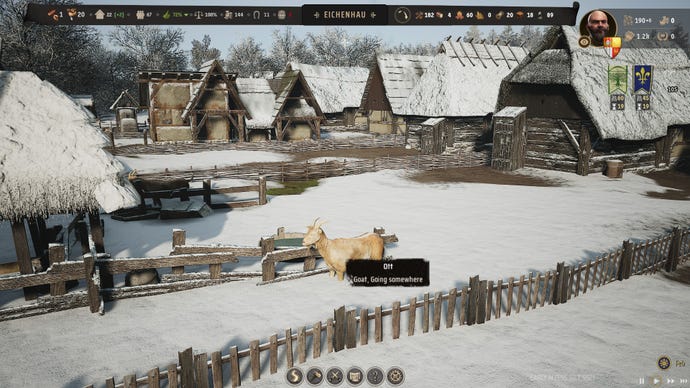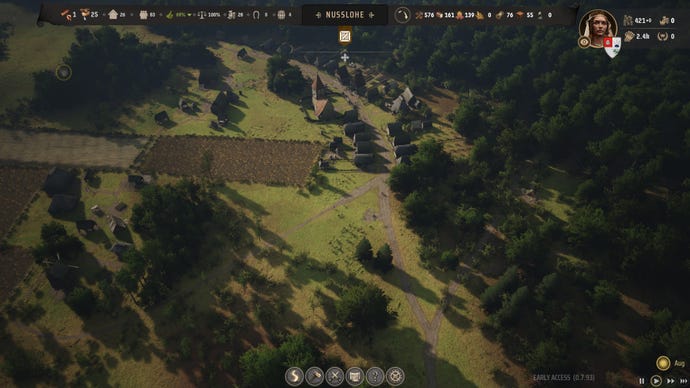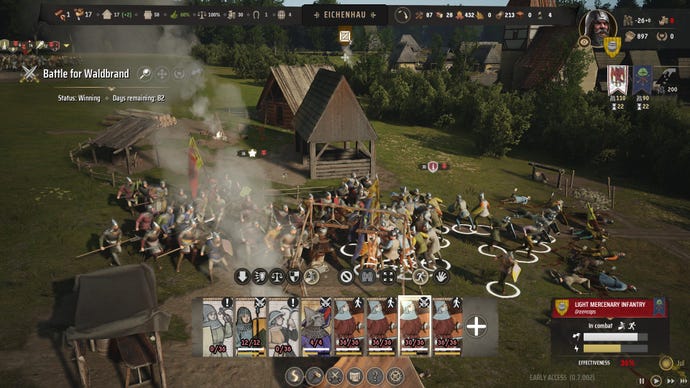When, in town building simulation Manor Lords, you erect your first manor, it feels natural to place it in the center of your humble 14th century European settlement. It presents as a locus of power, where your character avatar resides. Also, it’s right there in the title. I built mine down a side road, between oxen posts and granaries, for no real reason but free space. The more I play, the more it feels a fitting place. Not sidelined, exactly, just not especially loud. I need the taxes it brings to pay mercenaries to see off bandits, but lords – their whims and ambitions – don’t set the tone here. Parchment and seals aren’t as important as tilled earth; as winter snow, spring thaws and autumn harvests. So, despite the title, this sedate, curious, and intricate sim isn’t really about lords, nor manors. Not half as much, anyway, as it is about manure.
Or at least things manure-adjacent, anyway. Farming. Cattle. Manor Lords is possessed of an earthy, knees-in-the-dirt presence that wafts potent throughout, despite the usual sterile genre concerns around efficiency and logistics occasionally doing their best to obscure it. There’s still spreadsheeting and checklists, sometimes quite literally in the case of trade or the residential needs of your population, here represented as individual families, each assigned to their own job or structure. There are stockpiles and survival elements, too. A helpful UI icon condenses all the different foodstuffs – garden-grown veg or hunted wild deer, honey or bread – into a single counter of how many months your settlement could survive if everything ground to a halt. This is all engaging enough to optimise, sure. But the real drive here is to watch things grow and flourish from a handful of tents and dirt roads to a place so lively, thriving and rustic you can almost smell the hay and droppings.
This may be a happy accident of early access, where objectives to survive or conquer territory do exist, but sit absent of enough additional progression systems to make them seem especially tempting, at least over the meditative and curious digital custodianship in which Manor Lords’ true joys lie. On the map level, sure. There are opposing forces and regions to lay claim to. But on the ground level, you’re encouraged to exist alongside your surroundings rather than overcome them. Hunt greedily, and there will soon be nothing left to hunt at all. Cut down trees without planting more, and you’ll soon find woods dwindling. Force the soil to provide in perpetuity, with no time to fallow, and any efforts to rise, grind, and get that good bread will come to naught.

Ever owned a breadmaker? A life-changing tip: put it on before you go pub. Skip the kebab, and come home half-cut to the smell of a fresh baked loaf you can immediately demolish in a blissful frenzy. I reminisced on this singular joy as I decided that, since explaining the game’s every intricacy would be exhausting, beer and bread make for a good lens. To upgrade your burgage plots – houses, effectively – you’ll need to meet the residential needs of the residing families. This starts simple. Water from a well, a church, a few different foodstuffs. Clothing is trickier, but hunted game provide hides, so plonk down a tannery and you’re sorted. But eventually, as is the trajectory of so many civilisations, god will stop listening, and everyone will want to get pissed.
For beer, you’ll first want to find fertile ground for barley specifically, since each of the four crops have different needs. Then, you’ll need to place and populate a farmhouse, maybe with a designated oxen for faster tilling if you’ve got the upgrade. Once autumn arrives, you’ll harvest and transport the barley to another building which turns it into malt. Lastly, you’ll transport it to the tavern, although you can turn a burgage plot into a brewery, which still acts as a residence but locks the family that live there from taking on any other jobs. For bread, you’ll grow wheat, then the farmhouse will turn it to grain, the miller to flour, and then finally the communal over to bread. Throughout all this, you’ll need to keep the separate buildings fueled with firewood, and ideally have oxen and guides to transport everything around, lest villagers with handcarts have to do it much slower.

So, that’s several buildings and up to a dozen families just to keep everyone in a single foodstuff and the occasional pint. I think it’s this, even more so than the wattle and daub homes and the monkish diets, that keeps things feeling humble, even for such a technically lush and lavish digital world. There are no real incentives to hoard wealth save mercenary insurance to keep your village safe, no options for luxury or even decoration save a few simple cosmetics. Joy here is where the aesthetic and ascetic meet: rows of well-fed, warm homes. Sensible road networks buzzing with foot and hoof traffic from tiny industries. They all make the humble feel like a worthwhile achievement.
Sometimes it feels like an achievement because Manor Lords seems deliberately obtuse, mind, although never nonsensical. Your villagers do have minds of their own, so while you can set tasks and priorities, you can never fully plot out individual routines. After one harvest season, my mill and oven just wouldn’t start producing again, despite multiple workers assigned to each. All it took for this clog in the pipeline was a single field out of five set to ‘high’ priority instead of ‘medium’. You’ll have the luxury of an RPS stuffed to the gills with life-changing guides, of course. But my first couple of sessions were effectively just learning the ropes, since the most obvious omission from this early access launch is a proper tutorial.
There is a military industry, but I don’t see myself ever really engaging with it unless forced to. Mercenaries are capable and plentiful enough for my needs, which are building in peace and occasionally handing out spears to the baker and chums so they can go attack a bandit camp, giving me enough money to set up another trade route. We really do grow some nice carrots round these parts, and I’d like more people to try them.

When Manor Lords does require violence, it’s Total War combat without that series’ context. Put your bows behind your spears. Don’t rush your lads around too much or they’ll get tired and fight worse. It’s very impressive to behold, but I feel it’s almost similar to Total War by accident. That is, a continuation of the ethos found elsewhere; of course you can see every individual combatant, because we don’t do abstraction ‘round here if we can avoid it. The most exciting thing about combat is the music, which is to say that combat is quite good – the music is excellent.
Manor Lords’ real personality is not in its conflicts, but in the place where it transforms from a very pretty logistical puzzle into something more idiosyncratic; where life peeks out from the blueprints like a summer sun from behind a plastic globe. During harvest season, you’ll want to take families off other jobs and assign them to the farm, then just sit and watch as hunters and traders and millers and miners all pitch in to bring in that years’ yield, the whole village working as one. Elsewhere, the nuances of life do give way to that abstraction otherwise avoided. No fistfights in the street over goat theft. No accusations of witchcraft. Public order isn’t really a concern. Disease feels minimal and underdeveloped. But that’s part of the deal at this stage. I’m left not entirely sure what sort of game this wants to be, aside from one that feels sturdy and real and convincing, but I’m excited to find out.
The main challenge Manor Lords faces as it evolves through early access is, I think, how to be more transparent with its inner workings without fully showing its hand; lessening some of its magic. I don’t want to know exactly what the ants in the farm are thinking as they carry leaves to and fro, after all, but I’d probably like to know a bit quicker why they’ve all suddenly stood still. And, to an extent, I do think figuring out these inner workings is part of the intended challenge. Such basic rules can seem an unusual thing to obscure for a management sim, but then again, Manor Lords is a much more unusual game than it might first appear. It definitely doesn’t feel even close to complete, but it does feel alive. That’s much more important.
This review was based on a review build of the game provided by the developers.











Add comment